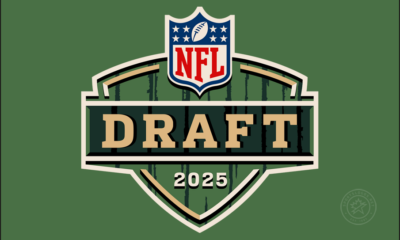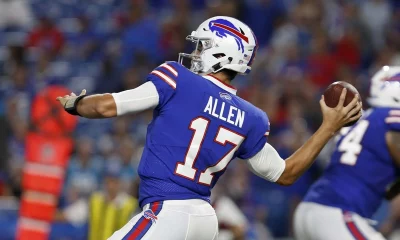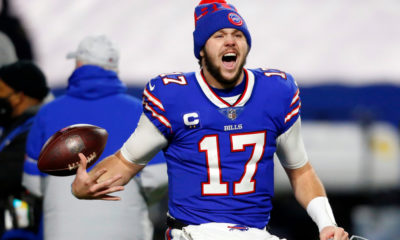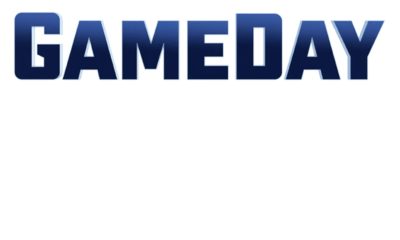
Chicago Bears– When this team became a charter member of the American Professional Football Association (APFA) in 1920, the team was located in Decatur, IL, and was named after team sponsor, the Staley Starch Company. The team moved to Chicago in 1921 and became the Chicago Staleys. In 1922, after team founder-manager and star end George Halas purchased the team, he changed the name to the Bears. Halas reasoned that because football players were generally bigger than baseball players, and the city’s baseball team was the Cubs, then logically the football team should be the Bears.
Cincinnati Bengals– Paul Brown selected the name because there had once been a pro football team in Cincinnati named the Bengals and adopting that name “would provide a link with past professional football in Cincinnati.”
Buffalo Bills– Buffalo’s team in the All-America Football Conference (AAFC) in 1946 was the Bisons. In 1947 a contest was held to rename the team, which was owned by James Breuil of the Frontier Oil Company. The winning entry suggested Bills, reflecting on the famous western frontiersman, Buffalo Bill Cody. Carrying the “frontier” theme further, the winning contestant further offered that the team was being supported by Frontier Oil and was “opening a new frontier in sports in Western New York.” When Buffalo joined the new American Football League in 1960, the name of the city’s earlier pro football entry was adopted.
Denver Broncos– Broncos was the winning entry in a fan contest held in 1960 by the original AFL team. The football team, however, isn’t the first to be called theDenver Broncos. Denver’s 1921 entry in the Midwest Baseball League was also called the Broncos.
Cleveland Browns– The Cleveland All-America Football Conference franchise conducted a fan contest in 1945 to name the team. The most popular submission was Browns in recognition of the team’s first coach and general manager Paul Brown, who was already a popular figure in Ohio sports. Brown at first vetoed the choice and the team selected from the contest entries the name “Panthers.” However, after an area businessman informed the team that he owned the rights to the name Cleveland Panthers, from an earlier failed football team, Brown rescinded his objection and agreed to the use of his name.
Tampa Bay Buccaneers– A team advisory board reviewed 400 name possibilities and selected Buccaneers, based on a local pirate legend.
Arizona Cardinals– Contrary to popular logic, the team was not named after the beautiful bird but instead because the team played in used maroon jerseys the original team (in pre-NFL years) had purchased from the University of Chicago. When an observer scoffed that the jerseys were “faded red,” team owner Chris O’Brien countered that they weren’t “faded red,” they were “Cardinal red.”
San Diego Chargers– Barron Hilton picked the Chargers name when he purchased an AFL franchise for Los Angeles. “I liked it because they were yelling ‘charge’ and sounding the bugle at Dodgers Stadium and at USC games.”
Kansas City Chiefs– The AFL franchise began in 1960 as the Dallas Texans. When the team was moved to Kansas City in 1963, the new name was selected by a fan contest.
Indianapolis Colts– Baltimore’s first pro football team was a member of the 1947 AAFC. A fan contest produced the Colts name reflecting the great tradition and proud history of horse breeding and racing in the Baltimore region. The originalColts disbanded after the 1950 season but the name was retained when a new Baltimore franchise began play in 1953. The Colts moved to Indianapolis in 1984.
Dallas Cowboys– In the initial months following the its formation, the Dallas team was known as the “Steers.” After a few weeks, however, the name was changed to “Rangers.” At the same time, a baseball team operated in Dallas under that name, but was scheduled to fold before the 1960 football season. However, when the baseball team decided to play one more season, Clint Murchison Jr. and Bedford Wynne, owners of the new NFL team, selected the name of Cowboys to avoid confusion.
Miami Dolphins– The name was selected in a name the team contest. The bottlenose dolphin, an intelligent creature with an irresistible built-in grin, has inspired wonder for centuries. “The dolphin is one of the fastest and smartest creatures of the sea,” Joe Robbie said in announcing the team name on October 8, 1965. “Dolphins can attack and kill a shark or a whale. Sailors say bad luck will come to anyone who harms one of them.”
Philadelphia Eagles– When Bert Bell established his NFL franchise in Philadel-phia in 1933, the country was struggling to recover from the Great Depression. New president Franklin D. Roosevelt had introduced his “New Deal” program through the National Recovery Administration, which had the Eagle as its symbol. Since Bell hoped his franchise also was headed for a new deal, he picked Eagles as the team name.
Atlanta Falcons– The name Falcons was suggested by Julia Elliott (1909-1990) a high school teacher from Griffin, Georgia who won a contest in 1965. Though 40 other contestants had also suggested the name, Elliott wrote in an essay, “The falcon is proud and dignified, with great courage and fight. It never drops its prey. It’s deadly and has a great sporting tradition.” Among the many suggested names were the Knights, Bombers, Rebels, Crackers, Thrashers, Lancers, Firebirds, Fireballs and Thunderbirds.
San Francisco 49ers– The 49ers name was adopted when San Francisco obtained an AAFC franchise in 1946. The name was selected as a recognition of the pioneering and adventurous spirit of the men of the 1849 gold rush in the Sierra Nevada mountains east of San Francisco.
New York Giants– To distinguish itself from the professional baseball team of the same name, the football team was referred to as the New YorkFootball Giants. Although the baseball team moved to San Francisco in 1957, the football team continues to use New York Football Giants as its legal corporate name, and is often referred to as such by fans and sports-casters. The team has also gained several nicknames, including “Big Blue,” the “G-Men,” the “Big Blue Wrecking Crew,” and the “Jints,” a name seen frequently in the New York Post, originating from the baseball team when they were based in New York.
Jacksonville Jaguars– The Jaguars name was selected through a fan contest. Finalists for the name included the Sharks, Stingrays and even Panthers, but Jaguars was ultimately selected on December 6, 1991.
New York Jets– New York’s original AFL team was called the Titans. When Sonny Werblin took over the franchise in 1963, he changed the team name to Jets to reflect the modern approach of his team and the star-studded performances he hoped his team would produce.
Detroit Lions– In 1934, a group led by Detroit radio executive George Richards (owner of Detroit’s powerful WJR) bought the Spartans and moved them to Detroit. Richards renamed the team the Lions, as a nod to the Detroit Tigers. He also said that the lion was the monarch of the jungle, and he intended for his team to be the monarch of the NFL.
Green Bay Packers– Curly Lambeau solicited funds for uniforms from his employer, the Indian Packing Company. He was given $500 for uniforms and equipment, on the condition that the team be named for its sponsor. Today Green Bay Packers is the oldest team-name still in use in the NFL.
Carolina Panthers– Team owner Jerry Richardson’s son Mark is responsible for the selection of Panthers as the team name. Mark, who felt that there should be some “synergy” between the name and the team colors also suggested the team colors of black, blue and silver.
New England Patriots– The new AFL team, originally located in Boston, was named the Patriots because of the area’s heritage as the birthplace of the American Revolution.
Oakland Raiders– For a brief period, the new AFL team was known as the Senors but by the time the 1960 season started, the Oakland team was known as theRaiders. The origin of the Raiders name is not known but, since it is doubtful a fan contest would have been staged in Oakland since the first team would have to play in San Francisco, it is most likely the name was chosen by principal owner Chet Soda and his partners.
St. Louis Rams– The franchise was originated in Cleveland in 1936 as a member of the American Football League. In 1937 the team joined the NFL. Principal owner Homer Marshman and his general manager, Damon “Buzz” Wetzel picked the Rams name because Wetzel had said his favorite football team had always been the Fordham Rams and Marshman liked the sound of the name.
Baltimore Ravens– Ravens was selected from among 3 finalists in a poll conducted by the Baltimore Sun. Baltimore fans selected the name in honor of Edgar Allan Poe, the American poet who penned his famous poem, “The Raven” while living in Baltimore.
Washington Redskins– Founder George Preston Marshall named the team Boston Braves after the city’s Major League Baseball team. However, after a financially devastating and poorly attended season in 1932, Marshall abandoned the Braves name in favor of the Redskins. When the team moved to Washington in 1937 it retained the name.
New Orleans Saints– The name Saints was the popular choice in a fan contest staged by the New Orleans States-Item. However, with or without the contest, the New Orleans team would most likely have been called theSaints. The franchise was awarded on All Saints Day, November 1, 1966. New Orleans was famous worldwide as the city of jazz and the famous marching song, “When the Saints Go Marching In.”
Seattle Seahawks– The name Seattle Seahawks (a seahawk is another word for an Osprey) was selected on June 17, 1975 after a public naming contest which drew more than 20,000 entries and over 1,700 different names.
Pittsburgh Steelers– Originally named Pirates after the city’s major league baseball team, Owner Art Rooney Sr. changed the team name to Steelers in 1940 to more properly represent the city’s dominant steel industry.
Houston Texans– After Houston was awarded the NFL’s 32nd franchise on October 6, 1999, a series of focus groups were formed to help come up with a nickname for the team. On March 2, 2000, the team announced five choices, the Apollos, Bobcats, Stallions, Texans and Wildcatters. The list was then shaved to the Apollos, Stallions and Texans a month later. After careful deliberation, the team unveiled the Texans‘ name, colors, and logo at a rally held in downtown Houston on September 6, 2000.
Tennessee Titans– After playing two seasons as the Tennessee Oilers, team owner Bud Adams formed an advisory committee to research names and a “Guess the Name” contest to gain additional feedback was also held. The committee selectedTitans citing the desire to have a nickname that reflected “strength, leadership and other heroic qualities.”
Minnesota Vikings– Bert Rose, the first general manager of the Minnesota team that began NFL play in 1961, selected the Vikings name because so many people in Minnesota and the surrounding area traced their heritage to Scandinavia (what is now Denmark, Norway, and Sweden).





















Facebook
Twitter
RSS